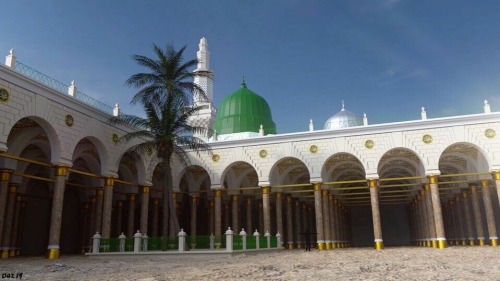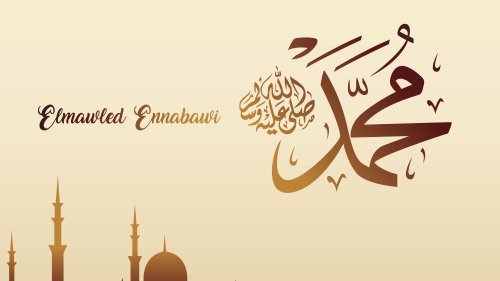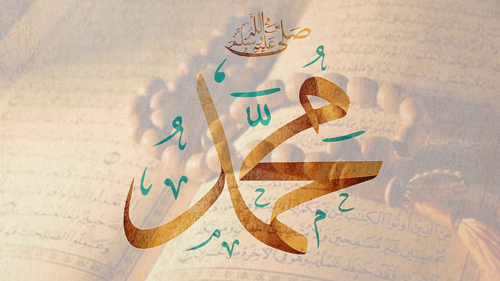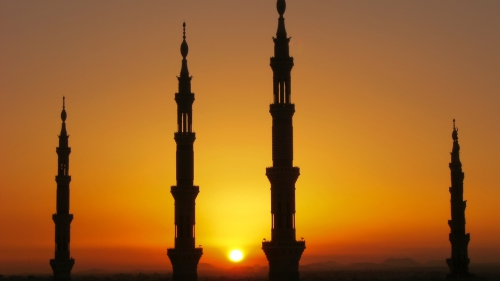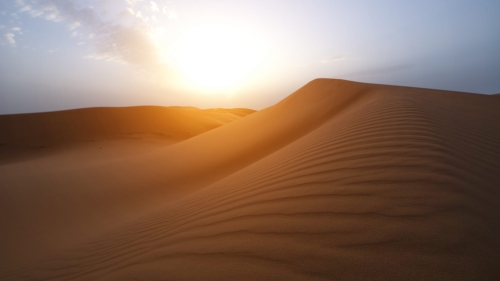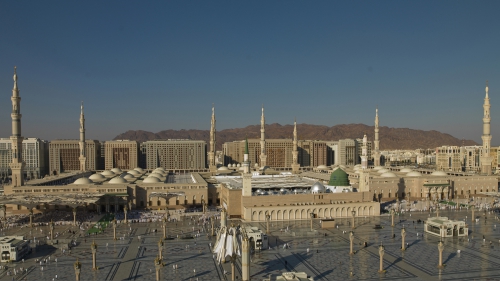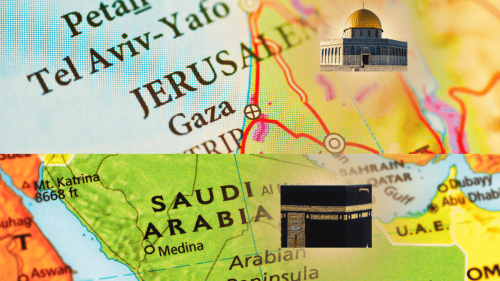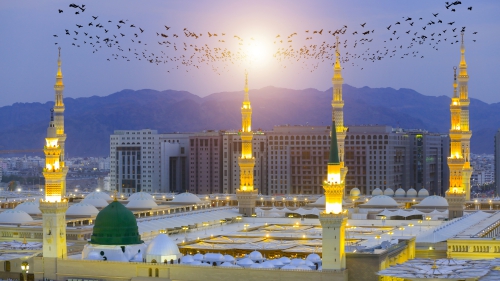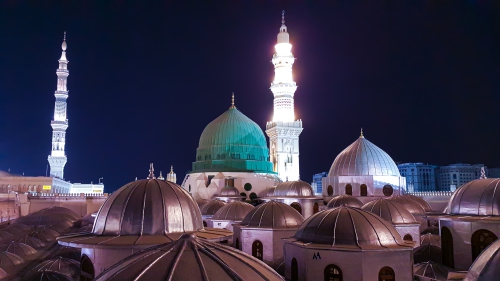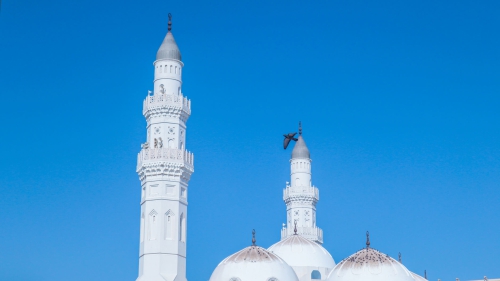The Introduction of the Prophet's Mosque in Madinah
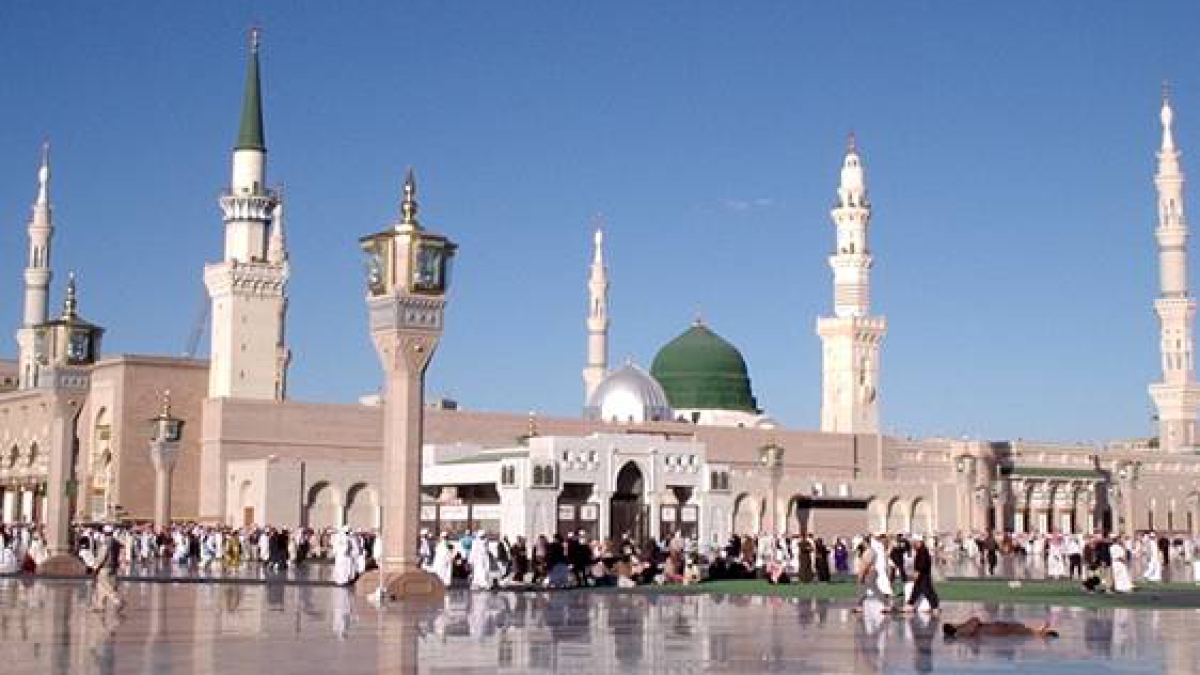
The first urban element introduced by Prophet Muhammad (pbuh) to the city of Madinah was the mosque institution which functioned as a community development center. While in Makkah, the Prophet (pbuh) and his followers were denied the existence and free utilization of their mosques, although they were in dire need of them. As a result, they were denied free and proper practice of their new Islamic faith. They were thus denied some of their basic human rights. They were denied the freedom of thought, expression and practice of their beliefs. However, in order to offset partially this deficiency in Makkah, the first Muslims utilized some Muslim houses, or some quiet, secret and safe spots located mainly in the outskirts of Makkah, to serve the purpose on an interim basis. They even got accustomed to going and visiting the Ka'bah or al-Masjid al-Haram, albeit without openly and freely performing their religious rituals there. Al-Masjid al-Haram was then controlled by polytheists and polytheistic ideas and customs, both from inside the city of Makkah and from abroad. This way, as much as symbolically only could al-Masjid al-Haram function as the mosque, as well as the nucleus, in the lives of the early believing Muslim community. Such a state of affairs continued for about 13 years following which Allah brought about a change and granted the Muslims and their Prophet (pbuh) that which they had been yearning for. They managed to migrate to Madinah where all the necessary conditions for establishing a well-structured, thriving, free and autonomous state existed.
To what extent the mosque institution was desirable both to propel the struggle for the Islamic cause to a higher level, and to spur and facilitate the overall progress of the Muslims and their young community, testifies the following event. On the way from Makkah to Madinah, the Prophet (pbuh) rested four, or fourteen, or eighteen, or twenty two days in Quba', a suburb of Madinah about two to three miles to the southeast of the city, whence he next proceeded to his final destination, the city of Madinah proper. Even though his stay in Quba' accounted for a short interval under some totally new circumstances which everyone was craving for, the Prophet (pbuh) succeeded in establishing a mosque there, "the Mosque of Piety", to which he later during his subsequent stay in Madinah frequently came, riding or walking. The Prophet (pbuh) is said to have first positioned a stone on the mosque's qiblah side (the qiblah then was towards al-Masjid al-Aqsa) followed by Abu Bakr, who positioned another stone. Next, the people started building.
 |
| The Prophet's mosque and some of its surrounding areas, seen from a nearby building. The size of today's Prophet's mosque, with all of its adjoining facilities and infrastructure, is approximately the size of what the core of the city of Madinah during the Prophet's time was. |
The Quba' mosque was the first mosque built by the Prophet (pbuh). Thus, it occupies a special place in the Islamic tradition. The Prophet (pbuh) once said: "He who purifies himself at home and then proceeds to the Quba' mosque for a prayer will procure the reward of the 'umrah (the lesser pilgrimage)." Certainly, it was because of this that the Qur'an referred to the Quba' mosque as "the Mosque of Piety". The Prophet (pbuh) loved to go and visit it.
That building and making the most of mosques as a matter of great urgency to the Prophet (pbuh) has been highlighted once again prior to the Prophet's arrival into the city of Madinah proper. It was Friday when the Prophet (pbuh) set off from Quba' to Madinah. On the way, before he arrived, the time for the Jumu'ah Prayer drew near. Being used to offering prayers wherever their appointed times overtook him, even if he happened to be in a sheepfold, the Prophet (pbuh) performed the Jumu'ah Prayer with the tribe of Banu Salim b. 'Uwq because he happened to pass right through their quarter at the time of the prayer. They prayed most probably at a plain that functioned as a makeshift mosque of the Banu Salim b. 'Uwq tribe. That was the Prophet's first Jumu'ah Prayer in Madinah. The number of worshippers was about one hundred; some estimated that it was about forty.
When Prophet Muhammad (pbuh) arrived in Madinah from Makkah - an exploit called hijrah or migration -- the first and immediate task relating to the built environment, as well as to the community building process, that he embarked on fulfilling was building the city's central mosque, also called the Prophet's mosque. Every other undertaking, including building houses for the migrants (muhajirs) who were practically homeless, had to be put off till after the Prophet's mosque was completed. Herein, too, lies a clue as to the extreme importance of the mosque and the profundity of its message in Islam.
 |
| The Quba' mosque |
When the migrants arrived in Madinah, almost all of them were very destitute and virtually homeless. At the same time, the aspiring community had no mosques or any other social institutions. While the first problem the Prophet (pbuh) was able to successfully manipulate and circumnavigate without really abandoning it and so causing any serious harm to the society, the latter predicament, however, could neither be disregarded, even for a short time, nor substituted with another feasible alternatives. Hence, the instituting of a principal mosque in Madinah needed immediate attention. For the housing of the migrants, a workable alternative had to be found.
If the migrants had no houses of their own, there were many other houses in Madinah which if shared were able to offer temporary relief. If truth be told, the migrants needed homes, rather than just houses. The Prophet (pbuh) sought to offer them the former. The latter, he knew, would come in due course. The migrants might have hastened immediately to acquire houses for themselves. But such would have been at the expense of acquiring homes, because they were in a foreign country in Madinah, having been forced to abandon their homes, properties, family roots and quite a number of closest family members in Makkah. Thus, providing homes, and not houses, was a priority for the migrants. That exactly was the thing which the Prophet (pbuh) had in mind and the natives of Madinah (the helpers or ansar) were excited about providing as a solution till the migrants got their own houses and homes. Hence, the helpers offered their houses to be shared with their brethren from Makkah. Although it was transitory in nature, the helpers' offering the migrants a genuine home went a long way towards the realization of the Prophet's and Islam's mission in Madinah.
 |
| The Jumu'ah mosque. It was here that the Prophet (pbuh) prayed his first Jumu'ah Prayer in Madinah. This mosque was built to commemorate the occasion. |
But there was nothing that could offset the absence of a mosque, the house of Allah, in Madinah. There was no existing structure, or an institution, that could offer any relief in case the establishment of a mosque was delayed. Even in the world of ideas, conceptually, a substitute for the mosque phenomenon did not exist. The matter thus could not be deferred, or taken lightly, as every forthcoming initiative utterly depended on it. Glorifying and worshipping Allah at a collective level could not have been deferred any longer. Perceiving and constructing a house of Allah, i.e., a mosque, for the purpose, was an obligation long overdue. The people were kept longing and craving for so long. Once in Madinah, they hardly could wait to bring their elongated unjustifiable misery to an end. Such is the importance of the mosque in the implementation of Islam as a comprehensive way of life. Such is the importance of the mosque, furthermore, in the development of the Islamic community, culture and civilization. The mosque is a lifeline for Islam and Muslims. On it, their survival depends.
Strengthening fraternity among the migrants (muhajirs) and helpers (ansar, or the natives of Madinah) was at all times one of the major goals of the Prophet's plans and actions. His general planning and building pursuits were no exception. By planning and building his mosque, prior to anything else, the Prophet (pbuh) wanted very much to help everyone in Madinah in terms of their quick and smooth adaptation and acclimatization to what was transpiring around them. Thus, he wanted to help the migrants and ease their pain with reference to the new natural environment and climate in Madinah which they suddenly found themselves in and which apparently did not suit them well, as well as with reference to their distressing economic and psychological conditions that resulted from the migration. Also, the Prophet (pbuh) wanted very much to assist the helpers (ansar), or the natives of Madinah, to come to terms as quickly and as painlessly as possible with a new socio-political landscape that was forming in their homeland, and with a new code of life which most of them had freshly embraced.
*****
This article is an excerpt from the author's recent book "Islamic Architecture: Its Philosophy, Spiritual Significance and Some Early Developments"
Dr. Spahic Omer, a Bosnian currently residing in Malaysia, is an Associate Professor at the Kulliyyah of Architecture and Environmental Design, International Islamic University Malaysia. He studied in Bosnia, Egypt and Malaysia. His research interests cover Islamic history, culture and civilization, as well as the history and philosophy of the Islamic built environment. He can be reached at spahico yahoo.com; his blog is at www.medinanet.org.
Topics: Madinah (Medina), Masjid Al Nabawi
Views: 24218
Related Suggestions
Iman of the Companions was very strong like mountain.They did
not have the facilities which we have today but yet they had
strong Iman as Companions of the PRophet. Alhamdu Lillahi today
we have nice and beautiful Masjid yet the Imaan very weak in
generalwhich is very unfortunate.We have to make effort to
improve and increase our Iman so that we live and die with that
Iman which is the maqsad of our lives. Immediately when we enter
Madinah it should remind us that this is the City of the beloved
Prophet who was specially chosen by Allah (S.W.T) to convey His
Message to the entire mankind and Jinns guiding the whole
humanity to the straight path.This is the place where all
ordinances and ways of the Prophet were promulgated.He preached
and made effort together with his companions to spread the True
Deen of Allah to all corners of the World which we neglect.All
my Ummah will enter Paradise except those who refuse said in
Hadith.They asked him who would refuse he said those who obey me
they will enter paradise and those who disobey me as if they
refuse.So the most important point to consider or real message
is to follow the ways of the Prophet in deeds and practice
avoiding all kinds of bidia or innovations which is so common.So
we should send Salawat on Rasulullah almost all the time we are
in Madinah the beautiful beloved Serene City of the Prophet
Allahumma Salli Ala Sayyidina MUhammadun Wa Barik WaSallim
Tasliman Katheerah.
Muhammad were bulldozed ruthlessly by Osama Bin Laden Real Estate Group to
make way for property development and even parking Garage? What a shame that
profits com first before piety! Inshallah.






